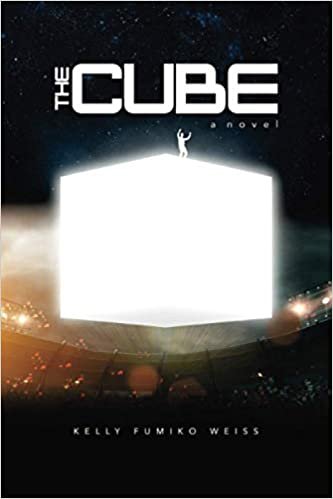Book Review: The Cube
The Cube. Kelly Fumiko Weiss. Rolling Meadows, IL: Windy City Publishers, March 20, 2018, Trade Paperback and E-book, 253 pages.
Reviewed by Marssie Mencotti.
The Cube takes place in the near future where game interaction as entertainment is carried out publicly in a series of carefully designed, culturally and geographically correct theme parks constructed throughout the U.S. and the world. The Cube is not only a revenue-producing game and theme park, but a privatized mechanism of charitable giving, which uses its revenue to fund many public causes, including infrastructure, aid to the disabled, major construction projects, and environmental outreach. It is generally shaping the world to its philosophy of sharing, while also enriching the upper class. Even with such a benign “Cubist” philosophy, there are some characters who chafe at the Cube’s power over their lives. It is also a “discovery of love” story, escalated by a strong undercurrent of mutual respect and trust.
The Cube is a fascinating read because its technology straddles our time and a future we can easily imagine. But where the fascination in this work lies is in mirroring the almost uncomfortable area we are undergoing right now. Amazon asks us about our giving preferences, the grocery store asks us to add a dollar for various charities, and of course, large corporations decide who is worthy of their tax-free largesse and want our brand loyalty in exchange for donations to their favorite charities. The future extension of that sort of donation determination is clearly moving toward corporate control, and the Cube furthers that dilemma. Will, theprotagonist, is okay with that, while his love interest, Molly, is not. They are old friends on the verge of rediscovery of their affection for one another, but they have a significant disagreement regarding the power and control of Cube culture. This is science fiction with a brain and a heart.
Will and Molly embark on a quest to discover why there are unexplained bronze symbols at certain Cube locations. This becomes an irresistible bonding exercise for them, their friends, Max and Sam, and Will’s brother, Chris. This band of friends has us rooting for them all the way. They encounter sinister resistance from a worthy tech villain, which makes their quest even more urgent.
The Cube is a fast-paced read with intelligent, hard-working, deeply loyal characters you cheer for all the way. I found certain areas of the work to be particularly compelling, such as the structure of the actual public Cube play that Will undertakes—from his “suiting up” preparation to the levels of play, their timing, and design. Equally exciting is the enthusiasm embodied in the genuine curiosity that binds these friends into full participation in breaking the code of the Cube’s embedded symbols.
Overall, I enjoyed this book for its energy, believability, and convincing honesty. It made me stop and think about the future of giving, friends supporting friends, and true, committed love as values that may remain at least into our near future. I think this book is an excellent choice for readers who like a good code-breaking chase and who like to think about what powers may rule their interactive gaming in the future decade or two. The Cube also includes some counter arguments of groups that oppose the Cube’s paternalistic philosophy, making this an excellent book club choice for its discussion possibilities.

